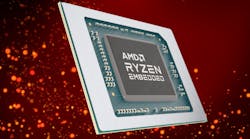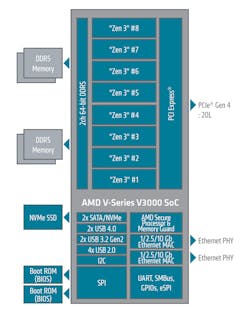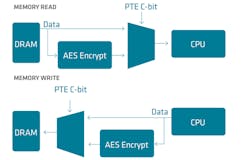AMD’s Ryzen Embedded V3000 series supports up to eight cores and 16 threads with 20 PCI Express Gen 4 lanes (one x8, three x4) and dual 10G Ethernet (Fig. 1). These chips target “Always On” storage and networking applications in addition to embedded edge applications that can use more compute performance. They’re built around AMD’s Zen 3 core.
Keep the base frequency to 1.9 GHz and power can be trimmed to 10 W; the top end consumes between 35 and 54 W. All versions have dual DDR5 controllers that handle 64-bit memory with up to 4,800 Mtransfers/s and ECC support. The chips come with up to 4 MB of L2 cache and 16 MB of shared L3 cache.
The chips have two SATA 3.0 interfaces and two x4 NVMe interfaces. In addition, two USB 4.0 ports support up to 20 Gb/s per channel, which is 40 Gb/s per port, and two USB 3.2 Gen2 run at 10 Gb/s. There are four additional USB 2.0 ports. Other interfaces include a UART, Secure I2C, SMBus, Secure SPI/eSPI, and GPIO. The dual SPI ROM interface supports secure firmware loading.
The chips incorporate an AMD Secure Processor and AMD Memory Guard (Fig. 2). Memory Guard encrypts memory using 128-bit AES encryption, which is transparent to the software. As a result, it can work with any operating system or application. Moreover, there’s minimal impact on performance.
The family is designed for applications that need long-term support. Planned product availability is up to 10 years. Linux operating system support includes upstreamed Ubuntu and Yocto drivers.
“We designed AMD Ryzen Embedded V3000 processors for customers seeking a balance of high performance and power efficiency for a wide range of applications in a compact BGA package,” said Rajneesh Gaur, corporate vice president and general manager, Embedded Solutions Group, AMD. “AMD Ryzen Embedded V3000 processors deliver a robust suite of features with advanced benefits required for superior workload performance in enterprise and cloud storage and networking products.”



